牛津译林8下Unit 1 Grammar课件 (共23张PPT)
文档属性
| 名称 | 牛津译林8下Unit 1 Grammar课件 (共23张PPT) |  | |
| 格式 | zip | ||
| 文件大小 | 974.6KB | ||
| 资源类型 | 教案 | ||
| 版本资源 | 牛津译林版 | ||
| 科目 | 英语 | ||
| 更新时间 | 2017-04-29 10:07:10 | ||
图片预览

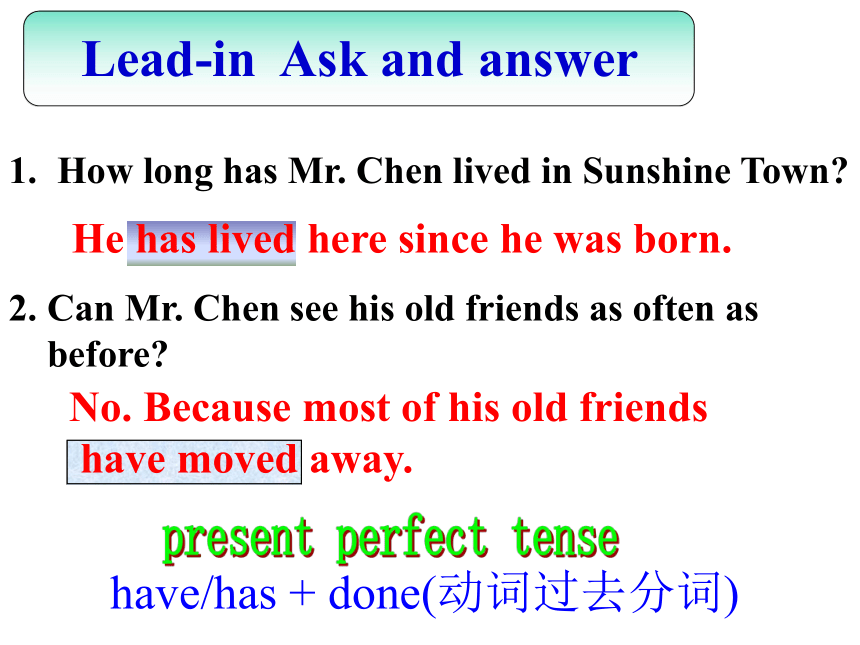
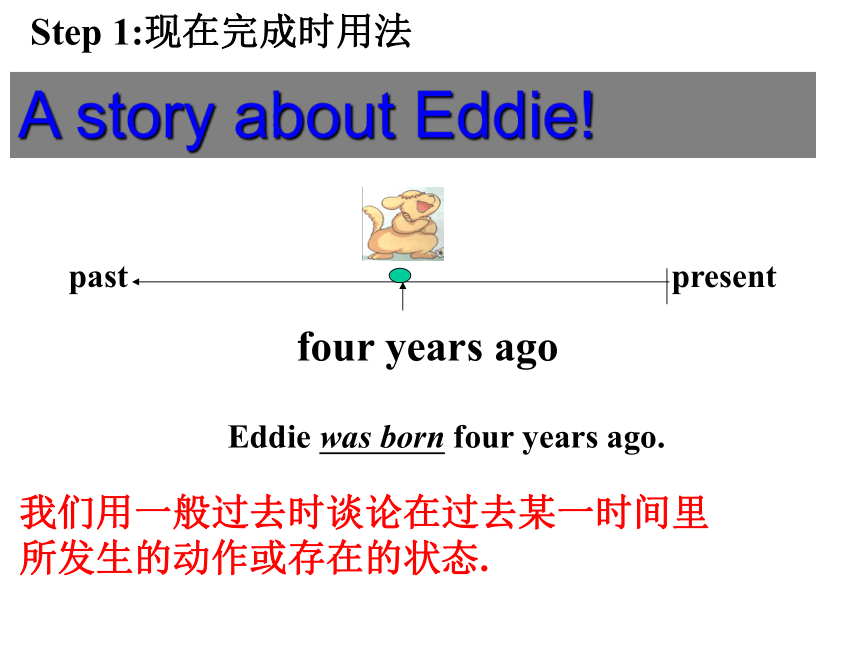
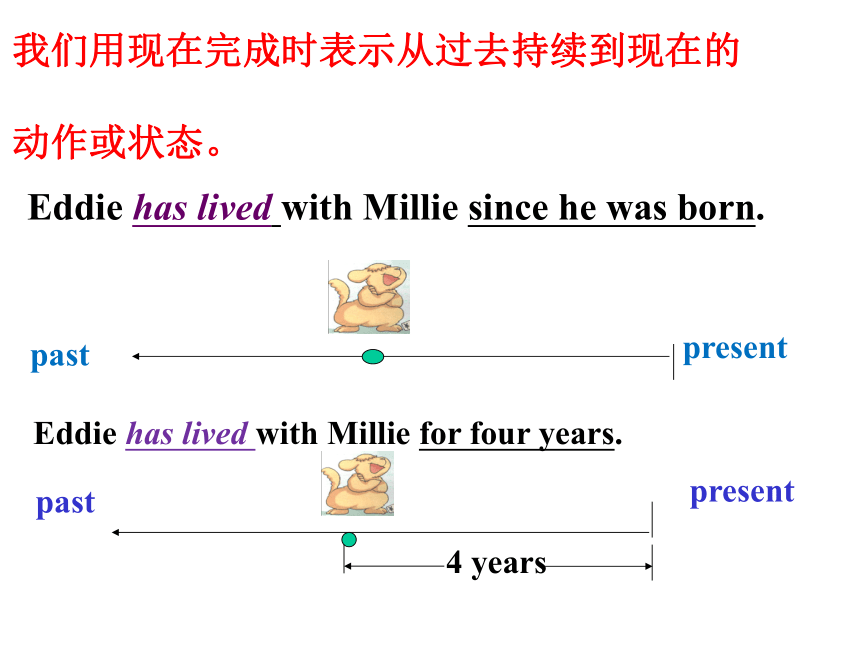
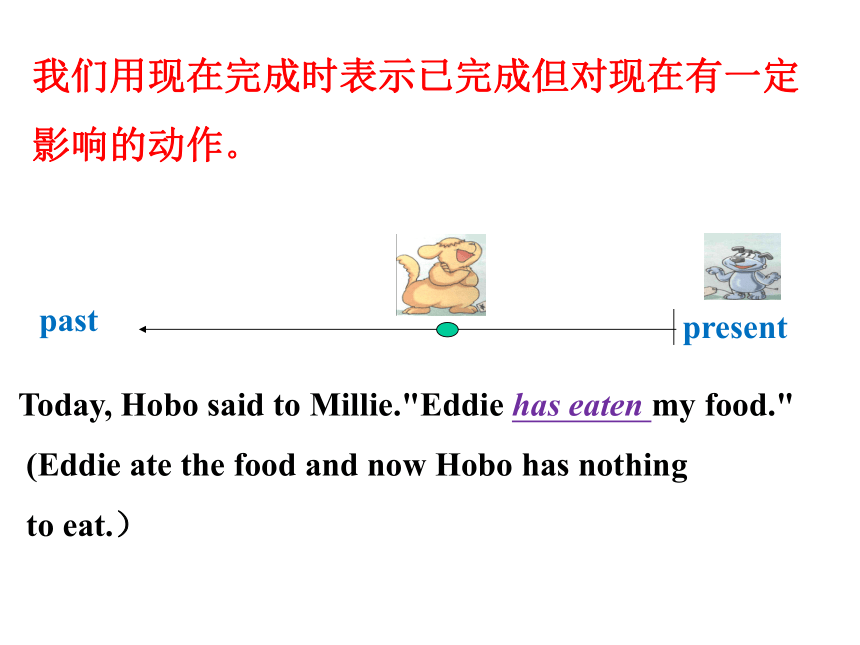
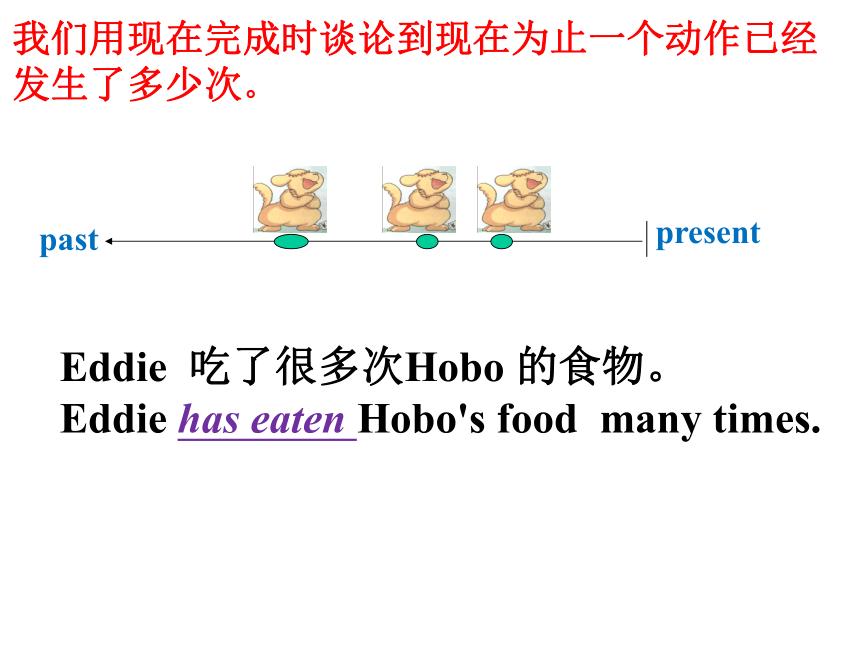
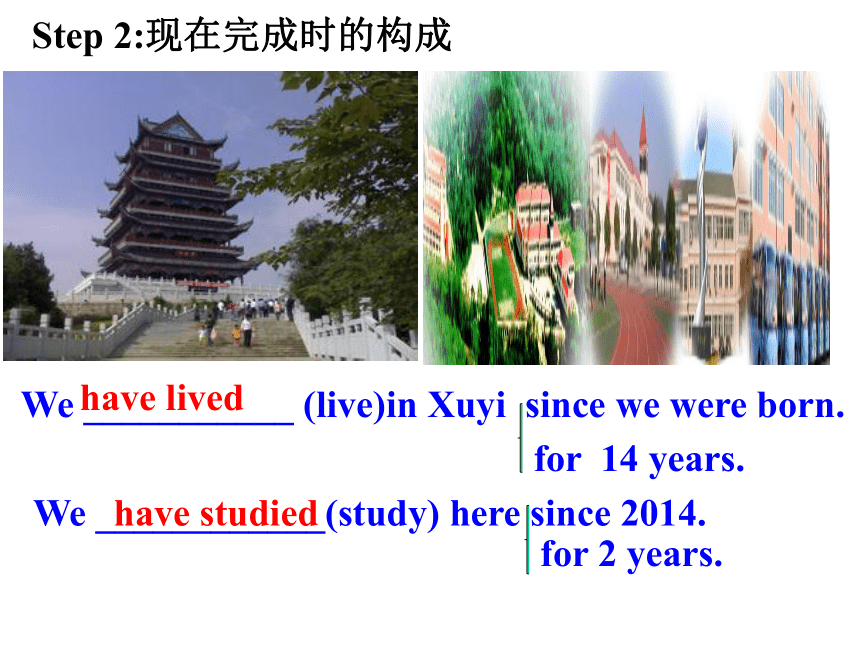
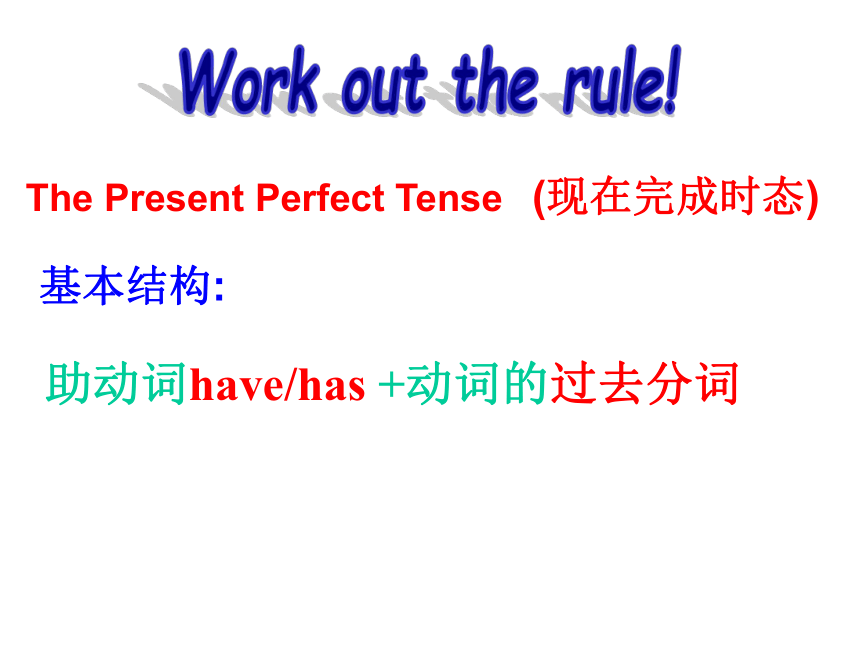
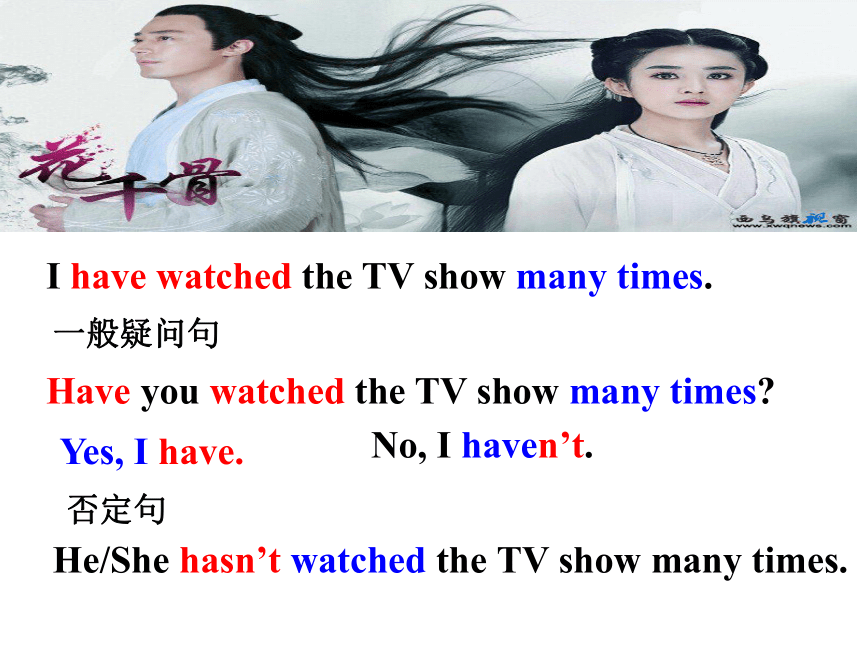
文档简介
课件23张PPT。The Present Perfect Tense
现在完成时8下Unit 1 GrammarHow long has Mr. Chen lived in Sunshine Town?
2. Can Mr. Chen see his old friends as often as
before?He has lived here since he was born.No. Because most of his old friends
have moved away.
Lead-in Ask and answer have/has + done(动词过去分词)present perfect tenseA story about Eddie! past present
Eddie was born four years ago.我们用一般过去时谈论在过去某一时间里所发生的动作或存在的状态.Step 1:现在完成时用法four years ago我们用现在完成时表示从过去持续到现在的
动作或状态。
presentpastpastpresent4 years Eddie has lived with Millie since he was born.
Eddie has lived with Millie for four years.我们用现在完成时表示已完成但对现在有一定影响的动作。presentpastToday, Hobo said to Millie."Eddie has eaten my food."
(Eddie ate the food and now Hobo has nothing
to eat.)我们用现在完成时谈论到现在为止一个动作已经发生了多少次。pastpresentEddie 吃了很多次Hobo 的食物。
Eddie has eaten Hobo's food many times.
We ___________ (live)in Xuyi since we were born. for 14 years. have livedStep 2:现在完成时的构成 We ____________(study) here since 2014. for 2 years. have studiedThe Present Perfect Tense (现在完成时态)基本结构:助动词have/has +动词的过去分词Work out the rule!I have watched the TV show many times. Have you watched the TV show many times? Yes, I have.No, I haven’t. He/She hasn’t watched the TV show many times. 一般疑问句否定句The Present Perfect Tense (现在完成时)一般疑问式: 将 have/has提前到句首Work out the rule! 回答:肯定:
否定:Yes, …have/has.No, …haven’t/hasn’t.The Present Perfect Tense (现在完成时) 否定式: have/has not +动词的过去分词 Work out the rule! haven’t /hasn’tTask one (仿照例句看表格造句)Weclean the roomclean the windowsee a film make dinnerTheyShefly to Beijingvisit the Great WallMy father1. We ____________ the room but we _____________ the window.2. _______ you ________ the room? Yes, _______.
________ you ________ the window? No, __________.have cleanedhaven’t cleanedHave cleanedwe haveHave we haven’tcleanedbuy foodwatch Beijing Operamove
live
love
like动词的过去式和过去分词的构成:visit
repair
watch
finishvisited visited
repaired repaired
watched watched
finished finished
moved moved
lived lived
loved loved
liked liked verb+ed以不发音的e
结尾+dStep 3:过去分词的构成stop
mop
trap
planstopped stopped
mopped mopped
trapped trapped
planned planned
注:以一个辅音字母结尾的重读闭音节词,双写最后一个辅音字母+ed双写+edstudy
hurry
studied studied
hurried hurried去y+ied注:以辅音字母加y结尾的词,去y+ied.动词的过去式和过去分词的构成:过去分词的构成ABBAAA ABCABA不规则变化p0Task one:Play a game(说出所给动词的过去分词)1 borrow
2 hope
3 make
4 get
5 plan
6 cry7 send
8 watch
9 say
10 grow
11 hit
12 enjoy1 borrow
2 hope
3 make
4 get
5 plan
6 cryborrowed
hoped
made
got
planned
criedsent
watched
said
grown
hit
enjoyedTask two: Finish Part A on page 14
1 They ____________ (finish) their homework already.
2 John _____never ______ (visit) China.
3 Mr. Li ____________ (repair) over ten bicycles
since Monday.
4 We ___________ (not see) each other for years.
5 My parents ___________ (not come) back yet.
6 Our teacher ___________ (teach) us a lot about
the history of China.
have finished has visitedhas repairedhaven’t seenhas taughthaven’t come Finish Part B on page 14.Task two:I have watched the TV show already. Have you watched the TVshow yet? Yes, I have.No, I haven't.
I haven’t watched the TVshow yet. already一般用于肯定句中,yet一般用于否定句和 疑问句中I have _________ watched the TV show. 还,仍 Have you watched any interesting TV shows recently? (近来,最近)
Step 4:常用的时间状语用法alreadyTask one: 用already或yet填空
He has ________ visited many ?places in China.
2. Lily has had breakfast ___________.
Has she arrived _______??
Have they come ________?
5. The train hasn't arrived __________.
alreadyalreadyyet yet yet注意 "already" 在句中的两种位置.1.—Have you______ seen the film? —No. I have _______seen it.2. —Has the bus left _____?
—Yes. It has left________.
No. It hasn’t left_______.
everneveryetalreadyyet选择already, yet, never, ever填空。 Task two(1)already “已经”,放在肯定句句中或句末;
(2)yet放在疑问句句尾时,表示“已经”;
放在否定句句尾时,表示“还(没,不)”常用的时间状语区别(3)ever “曾经”,用于疑问句或否定句中;
(4)never “从来没有”,表示否定句中。(5)just “刚刚”,用于陈述句中;
(6)recently “近来”,用于句末。Chat time (Exercise C)
M : ______ you ____ (see)any films recently, Sandy?
S : No, I _______.What about you?
M : I __________ (see) one last Saturday.
S : What’s it about?
M : It’s about the changes in Beijing over the past century. From this film, I __________ (learn) more about Beijing’s past and present.
S: Oh, I think I __________ (hear) about the film. Do you plan to see it again?
M: Yes, I’d like to.
Haveseenhaven’tsawhave learnthave heard
2. Can Mr. Chen see his old friends as often as
before?He has lived here since he was born.No. Because most of his old friends
have moved away.
Lead-in Ask and answer have/has + done(动词过去分词)present perfect tenseA story about Eddie! past present
Eddie was born four years ago.我们用一般过去时谈论在过去某一时间里所发生的动作或存在的状态.Step 1:现在完成时用法four years ago我们用现在完成时表示从过去持续到现在的
动作或状态。
presentpastpastpresent4 years Eddie has lived with Millie since he was born.
Eddie has lived with Millie for four years.我们用现在完成时表示已完成但对现在有一定影响的动作。presentpastToday, Hobo said to Millie."Eddie has eaten my food."
(Eddie ate the food and now Hobo has nothing
to eat.)我们用现在完成时谈论到现在为止一个动作已经发生了多少次。pastpresentEddie 吃了很多次Hobo 的食物。
Eddie has eaten Hobo's food many times.
We ___________ (live)in Xuyi since we were born. for 14 years. have livedStep 2:现在完成时的构成 We ____________(study) here since 2014. for 2 years. have studiedThe Present Perfect Tense (现在完成时态)基本结构:助动词have/has +动词的过去分词Work out the rule!I have watched the TV show many times. Have you watched the TV show many times? Yes, I have.No, I haven’t. He/She hasn’t watched the TV show many times. 一般疑问句否定句The Present Perfect Tense (现在完成时)一般疑问式: 将 have/has提前到句首Work out the rule! 回答:肯定:
否定:Yes, …have/has.No, …haven’t/hasn’t.The Present Perfect Tense (现在完成时) 否定式: have/has not +动词的过去分词 Work out the rule! haven’t /hasn’tTask one (仿照例句看表格造句)Weclean the roomclean the windowsee a film make dinnerTheyShefly to Beijingvisit the Great WallMy father1. We ____________ the room but we _____________ the window.2. _______ you ________ the room? Yes, _______.
________ you ________ the window? No, __________.have cleanedhaven’t cleanedHave cleanedwe haveHave we haven’tcleanedbuy foodwatch Beijing Operamove
live
love
like动词的过去式和过去分词的构成:visit
repair
watch
finishvisited visited
repaired repaired
watched watched
finished finished
moved moved
lived lived
loved loved
liked liked verb+ed以不发音的e
结尾+dStep 3:过去分词的构成stop
mop
trap
planstopped stopped
mopped mopped
trapped trapped
planned planned
注:以一个辅音字母结尾的重读闭音节词,双写最后一个辅音字母+ed双写+edstudy
hurry
studied studied
hurried hurried去y+ied注:以辅音字母加y结尾的词,去y+ied.动词的过去式和过去分词的构成:过去分词的构成ABBAAA ABCABA不规则变化p0Task one:Play a game(说出所给动词的过去分词)1 borrow
2 hope
3 make
4 get
5 plan
6 cry7 send
8 watch
9 say
10 grow
11 hit
12 enjoy1 borrow
2 hope
3 make
4 get
5 plan
6 cryborrowed
hoped
made
got
planned
criedsent
watched
said
grown
hit
enjoyedTask two: Finish Part A on page 14
1 They ____________ (finish) their homework already.
2 John _____never ______ (visit) China.
3 Mr. Li ____________ (repair) over ten bicycles
since Monday.
4 We ___________ (not see) each other for years.
5 My parents ___________ (not come) back yet.
6 Our teacher ___________ (teach) us a lot about
the history of China.
have finished has visitedhas repairedhaven’t seenhas taughthaven’t come Finish Part B on page 14.Task two:I have watched the TV show already. Have you watched the TVshow yet? Yes, I have.No, I haven't.
I haven’t watched the TVshow yet. already一般用于肯定句中,yet一般用于否定句和 疑问句中I have _________ watched the TV show. 还,仍 Have you watched any interesting TV shows recently? (近来,最近)
Step 4:常用的时间状语用法alreadyTask one: 用already或yet填空
He has ________ visited many ?places in China.
2. Lily has had breakfast ___________.
Has she arrived _______??
Have they come ________?
5. The train hasn't arrived __________.
alreadyalreadyyet yet yet注意 "already" 在句中的两种位置.1.—Have you______ seen the film? —No. I have _______seen it.2. —Has the bus left _____?
—Yes. It has left________.
No. It hasn’t left_______.
everneveryetalreadyyet选择already, yet, never, ever填空。 Task two(1)already “已经”,放在肯定句句中或句末;
(2)yet放在疑问句句尾时,表示“已经”;
放在否定句句尾时,表示“还(没,不)”常用的时间状语区别(3)ever “曾经”,用于疑问句或否定句中;
(4)never “从来没有”,表示否定句中。(5)just “刚刚”,用于陈述句中;
(6)recently “近来”,用于句末。Chat time (Exercise C)
M : ______ you ____ (see)any films recently, Sandy?
S : No, I _______.What about you?
M : I __________ (see) one last Saturday.
S : What’s it about?
M : It’s about the changes in Beijing over the past century. From this film, I __________ (learn) more about Beijing’s past and present.
S: Oh, I think I __________ (hear) about the film. Do you plan to see it again?
M: Yes, I’d like to.
Haveseenhaven’tsawhave learnthave heard
